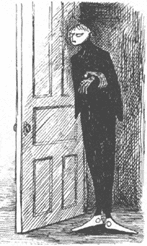I guess this makes it official: I’m a bit of a hardware person. I just successfully hacked my CueCat.
For them as don’t know, the CueCat scanner is a barcode reader. The only problem is, it outputs the barcodes in a weird CueCat encryption, so you need the CueCat software (or one of the many hacks) to use it. Some library sites (like my beloved LibraryThing) can handle CueCat output, but many can’t. I discovered that with a simple hardware hack, you can stop the encryption. Pretty sweet! I consulted teh intarwebs (notably this page and this one) and set about doing some tinkering. I figured, the little critters only cost $15, it’s worth a shot, right? Sure, LibraryThing can handle the encryption, but sometimes my CueCat doesn’t scan paperback barcodes properly, maybe this will fix it.
My CueCat is a 1966:

I got my tools:

Then I opened up the CueCat:

I identified the right pin, and severed it:

I reassembled the CueCat and tested it, and it worked like a charm!
Still can’t read paperback barcodes, though. Or rather, it produces exactly what the barcode says – which is NOT the ISBN number. Dammit. Oh, well. At least I proved to myself that I can indeed do a little hardware hacking!
EDITED TO ADD: I found out what the story is with paperbacks. Apparently mass market paperbacks have shorter barcodes on the outside of the back cover and standard barcodes on the inside of the front cover. So I can just scan the inside barcode. Yay! Thank goodness for the LibraryThing forum!
Also, I found this nifty set of notes from a LibraryThing user about using CueCats. Good stuff.



